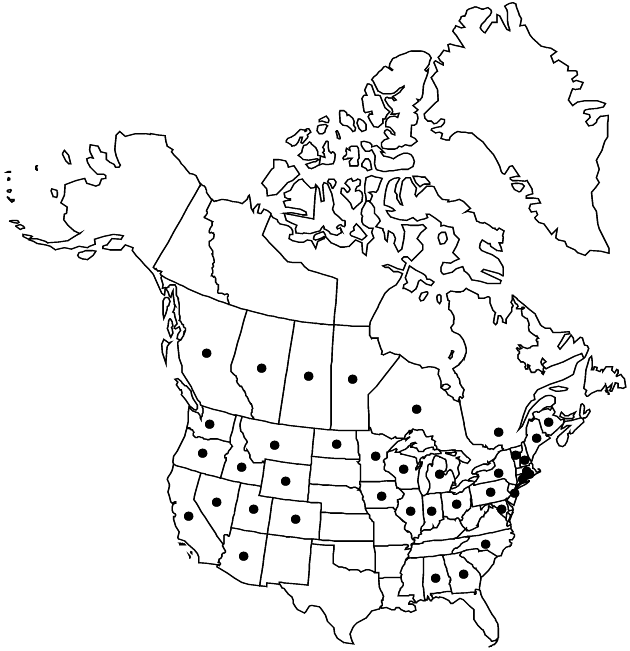Difference between revisions of "Arctium lappa"
Sp. Pl. 2: 816. 1753.
imported>Volume Importer |
imported>Volume Importer |
||
| Line 54: | Line 54: | ||
|publication year=1753 | |publication year=1753 | ||
|special status=Introduced | |special status=Introduced | ||
| − | |source xml=https:// | + | |source xml=https://bitbucket.org/aafc-mbb/fna-data-curation/src/2e0870ddd59836b60bcf96646a41e87ea5a5943a/coarse_grained_fna_xml/V19-20-21/V19_184.xml |
|tribe=Asteraceae tribe Cardueae | |tribe=Asteraceae tribe Cardueae | ||
|genus=Arctium | |genus=Arctium | ||
Latest revision as of 20:49, 5 November 2020
Plants to 100–300 cm. Basal leaves: petioles solid, 15–36 cm, glabrous or thinly cobwebby; blades 25–80 × 20–70 cm, coarsely dentate to subentire, abaxially thinly gray-tomentose, adaxially green, sparsely short-hairy to nearly glabrous. Heads usually in corymbiform clusters, long-pedunculate. Peduncles 2.5–6 cm. Involucres 25–45 mm diam. Phyllaries linear to linear-lanceolate, glabrous to loosely cobwebby, inner usually stramineous (sometimes purplish), margins with minute spreading or reflexed hairs. Florets 40+; corollas purple (occasionally white), 9–14 mm, glabrous. Cypselae light brown, often with darker spots, 6–7.5 mm; pappus bristles 2–5 mm. 2n = 32 (Japan), 34 (China), 36 (Japan); (Sweden).
Phenology: Flowering summer–early fall (Jul–Oct).
Habitat: Waste places, roadsides, fields, forest clearings
Elevation: 0–2200 m
Distribution

Introduced; Alta., B.C., Man., N.B., Ont., Que., Sask., Ala., Ariz., Calif., Colo., Conn., Ill., Maine, Mass., Mich., Minn., Nev., N.H., N.Y., N.Dak., Pa., R.I., Utah, Vt., Wash., Wis., Eurasia.
Discussion
BONAP lists Georgia, Idaho, Indiana, Iowa, Maryland, Montana, New Jersey, North Carolina, Ohio, Oregon, and Wyoming; I have not seen specimens.
Roots and young leaves of Arctium lappa are edible and can be used in a variety of food preparations. Extracts of Arctium species purportedly have health benefits and are sold as food supplements. This species is sometimes cultivated as a minor crop.
Selected References
None.